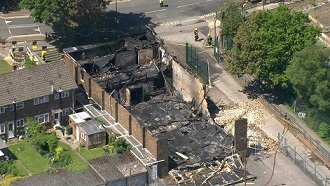 Around half of mosques and Muslim centres in Britain have been subjected to Islamophobic attacks since 9/11, academics have warned as the far-right English Defence League prepares to march to the south-London scene of Drummer Lee Rigby’s murder.
Around half of mosques and Muslim centres in Britain have been subjected to Islamophobic attacks since 9/11, academics have warned as the far-right English Defence League prepares to march to the south-London scene of Drummer Lee Rigby’s murder.
The figures are highlighted in a report which also found that the number of anti-Islamic attacks increased by as much as tenfold in the days following the Woolwich attack.
Meanwhile, research by The Independent shows Islamophobic attacks spreading across Britain, with mosques being set alight and Muslims targeted at home in the past month.
Despite the warning signs, a senior Government adviser told The Independent that there remains a “lack of political will” to take on the rise of Islamophobic attacks in Britain. The adviser, who did not want to be named, said that attempts to “tackle this issue – even before Woolwich – struggled to attract buy-in,” with the Secretary of State for Communities and Local Government, Eric Pickles, identified as the primary source of frustration.
The Muslim community was warned yesterday of the dangers it faces from hate groups in a sermon delivered at 500 mosques. The piece said that high-profile cases of sexual grooming of children by small groups of Muslim men “hitting the headlines in a short space of time and the fallout from the Woolwich case will create a major challenge for the Muslim community”.
The trial date for the two men accused of murdering Drummer Rigby, Michael Adebolajo, 28, and Michael Adebowale, 22, will begin on 18 November, it was announced yesterday.
Professor Nigel Copsey, of Teesside University, the author of the new report which showed that between 40 and 60 per cent of mosques and other Islamic centres (around 700) had been targeted since 9/11 – said: “There has undoubtedly been a spike in anti-Muslim incidents since the Woolwich murder. An obvious concern now is whether the number of hate crime incidents return to ‘normal’ levels or whether Woolwich has been a game-changer in terms of increasing the underlying incidence of anti-Muslim hate over the longer term.”
His report is based largely on figures from the Islamophobia watchdog Tell Mama. It shows an increase of attacks to nearly nine per day in the immediate aftermath of the Woolwich killing, but settling back to around two per day over in the following weeks. Prof- essor Copsey added: “What is significant about our analysis is the extent to which the far right is implicated in anti-Muslim hate crime.”
Just this week, swastikas and the letters “EDL”, “KKK” and “NF” were sprayed on the walls of a mosque in Redditch. There were also reports of pigs’ heads being left at Muslim families’ homes and other attacks against individuals. There was also a attack on an Islamic centre in north London.
But Dr Matthew Goodwin, associate fellow at Chatham House and an expert on extremist groups, said that “the broader picture is more positive than we think. Young people are more at ease accepting Muslims in society.”
A spokesman for the Department for Communities and Local Government said: “There is no place for anti-Muslim hatred or any kind of hatred in Britain, and we are committed to tackling this unacceptable scourge.”
